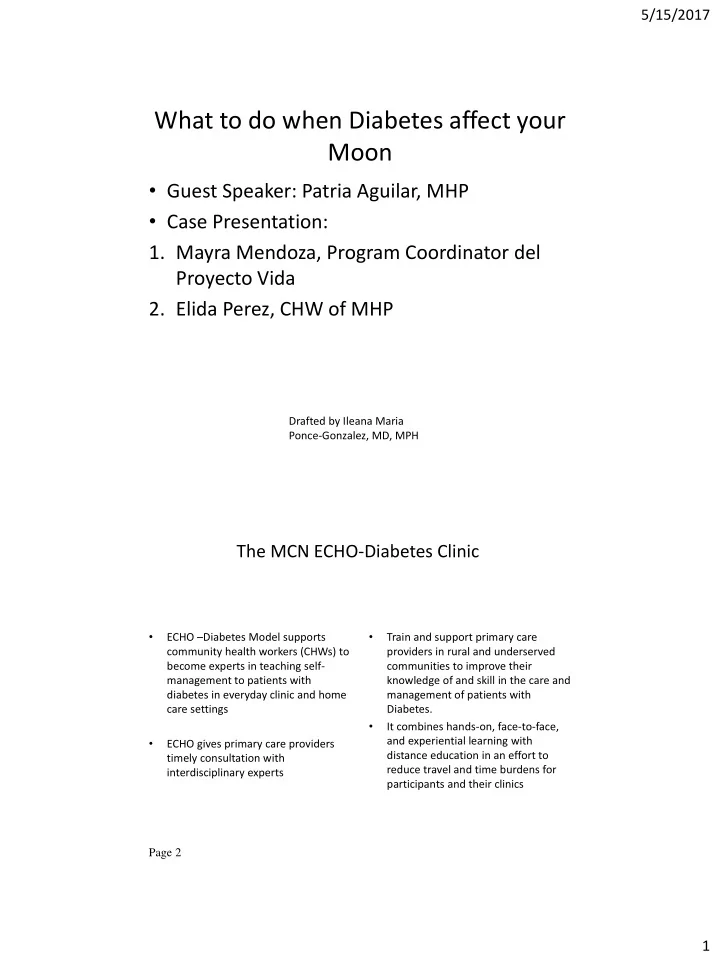

5/15/2017 What to do when Diabetes affect your Moon • Guest Speaker: Patria Aguilar, MHP • Case Presentation: 1. Mayra Mendoza, Program Coordinator del Proyecto Vida 2. Elida Perez, CHW of MHP Drafted by Ileana Maria Ponce-Gonzalez, MD, MPH The MCN ECHO-Diabetes Clinic • • ECHO – Diabetes Model supports Train and support primary care community health workers (CHWs) to providers in rural and underserved become experts in teaching self- communities to improve their management to patients with knowledge of and skill in the care and diabetes in everyday clinic and home management of patients with care settings Diabetes. • It combines hands-on, face-to-face, and experiential learning with • ECHO gives primary care providers distance education in an effort to timely consultation with reduce travel and time burdens for interdisciplinary experts participants and their clinics Page 2 1
5/15/2017 The MCN ECHO-Diabetes Clinic • • The participants will remain in their Clinics will benefit from the added communities working with their competencies that the CHW or CHR patients during the majority of will bring to the healthcare team training. • The participants will have the • Participants will learn from one opportunity to network, share another in a supportive and culturally information and resources’ appropriate environment • The participant will learn new skills to • The training recognizes the skills, grow professionally asp public expertise, and knowledge that CHWs speakers by presenting a real case and clinician already have during the ECHO-Diabetes Clinic Page 3 Learning Objectives 1. Understanding how diabetes can affect your moon. 1. Understand at least one barrier in the control of diabetes and depression. 2
5/15/2017 How Diabetes can affect your moon? Effects of mental illness include sustained abnormal alterations in thinking, mood, or behavior associated with distress and impaired functioning. 3
5/15/2017 The effects of mental illnesses can include disruptions of daily function; incapacitating personal, social, and occupational impairment; and premature death. The most common mental illnesses in adults are anxiety and mood disorders. 4
5/15/2017 Mental Illness by the Numbers 2, 3 Mental health disorders were one of the five most costly conditions in the United States in 2006. (AHRQ) (PDF, 615KB) Over 8.9 million persons in the U.S. have both a mental health and substance use disorder. (SAMHSA) Mental illness is associated with increased occurrence of chronic diseases such as cardiovascular disease, diabetes, obesity, asthma, epilepsy and cancer. (CDC) 2,4 5
5/15/2017 Mental illness is associated with lower use of medical care, reduced adherence to treatment therapies for chronic diseases and higher risks of adverse health outcomes. (CDC) 2,4 Abnormalities in the interactions between neurotransmitters and hormones in the brain (HPA); elevated cortisol 1 6
5/15/2017 Nearly 50% of U.S. Adults will develop at least one mental illness at sometime or another More than the blues but persisting malaise or other signs; beyond temporary mood change. 7
5/15/2017 Estimated that one fourth of the adult population experiences depression 1/4 Depression is more prevalent in women than in men 8
5/15/2017 Unresolved stress is a risk for depression 1 9
5/15/2017 Risk factors of Depression 5 Side effects Alcohol or Thyroid from some drug abuse problems medications Family history Social of either Obesity Isolation condition Coronary Hypertension Inactivity artery disease Family history of diabetes Obesity increases the risk of type 2 diabetes Race: it's unclear why, but blacks, Diabetes Risk Hispanics, American Indians and Asian-Americans — are at higher risk. Factors 14 High cholesterol Smoking and high blood pressure Sedentary lifestyle http://www.idf.org/node/26455?language=es 10
5/15/2017 Depression ? Diabetes Studies show that people with diabetes have a greater risk of depression than people without diabetes 11
5/15/2017 Depression can make diabetic symptom worse… Low blood sugar levels Low blood sugar at can also lead to hunger night can disturb your and eating too much sleep Diabetes can make symptoms of depression worse… Trouble controlling Poor control of blood sugar levels Denial of depression diabetes can cause can make people feel block good diabetes symptoms that look like they are losing self-care like depression control of their life 12
5/15/2017 Low energy It can be Regular blood Other difficult to sugar testing keep up with Challenges can feel like a good diet too much Increased anxiety Untreated depression can make it more difficult to successfully manage diabetes. 13
5/15/2017 Barriers facing treatment for depression and chronic conditions Time Stereotyping Culture & beliefs Cost\ Poor chronic condition management 14
5/15/2017 Seek support from family and friends 15
5/15/2017 Acupuncture Aerobic Tai chi exercise Spirituality Yoga Ideas for Alternative Therapies 12 Music or art Meditation therapy Massage Guided therapy imagery How can a CHW can help a person with depression? 1) Listen to them 2) Do not judge (sometimes we judge people with mental illnesses. 'Esta loco(a)' or''esta chflada(o)'. 3) Act as a source of support and education. 4) Link people with depression to local resources (support groups at the local church, etc) 16
5/15/2017 Referral of Patients to Appropriate Programs • Local Health Center • National Suicide Prevention Lifeline: 1-800-273- 8255 • Your Recovery is Our Recovery: 1 866-547-6451 • American Diabetes Association http://www.diabetes.org ECHO Diabetes-Case Presentation Page 34 17
5/15/2017 Stories from the field Questions? Patria Alguila [Need Contact Info and a Photo] This project is supported by the Health Resources and Services Administration (HRSA) of the U.S. Department of Health and Human Services (HHS) under cooperative agreement number U30CS09742, Technical Assistance to Community and Migrant Health Centers and Homeless for $1,094,709.00 with 0% of the total NCA project financed with non-federal sources. This information or content and conclusions are those of the author and should not be construed as the official position or policy of, nor should any endorsements be inferred by HRSA, HHS or the U.S. Government. 18
5/15/2017 References 1. https://www.cdc.gov/mentalhealthsurveillance/fact_sheet.html 2. http://www.apa.org/helpcenter/data-behavioral-health.aspx 3. https://en.wikipedia.org/wiki/Comorbidity 4. https://www.cdc.gov/mentalhealthsurveillance/fact_sheet.html 5. http://www.diabetes.org/living-with-diabetes/complications/mental- health/depression.html 6. https://www.qualitymeasures.ahrq.gov/hhs/content.aspx?id=3527#.WJ4xsm8rKUk 7. http://www.integration.samhsa.gov/clinical-practice/screening-tools#depression 8. http://www.mentalhealthamerica.net/mental-health-screening-tools 9. https://psychcentral.com/lib/diabetes-and-depression/ 10. http://www.diabetes.org/living-with-diabetes/complications/mental- health/stress.html 11. http://www.diabetes.org/living-with-diabetes/complications/mental-health/ 12. https://www.adaa.org/finding-help/treatment/complementary-alternative- treatment 13. https://www.psychologytoday.com/blog/when-your-adult-child-breaks-your- heart/201401/addressing-mental-health-treatment-barriers 14. http://www.mayoclinic.org/diseases-conditions/diabetes/basics/risk-factors/con- 20033091 19
Recommend
More recommend